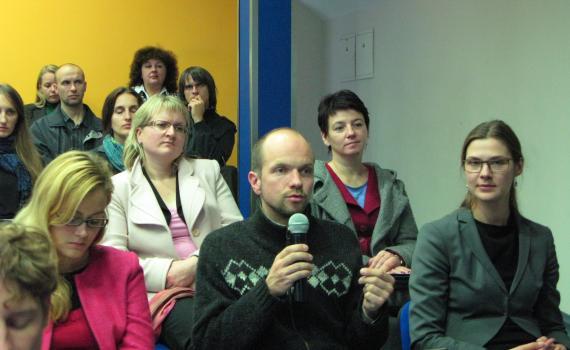
EIFL began working in Lithuania by organizing the first open access workshop in 2004, followed by another workshop in 2005. These workshops stimulated development of a national institutional repository and built a corps of open access advocates. Discussions about national policy led to the adoption on 30 April 2009 of the law on Higher Education and Research, which stipulated that the results of all research carried out in state higher education and research institutions must be communicated to the public.
This was a big step forward for open access. However, awareness about open access and how open access benefits research remained limited. In 2011, a survey of the Association of Lithuanian Serials (an umbrella organization for Lithuanian research journals) showed that the majority of Lithuanian research journals were uploaded to institutional websites. Although the research was published in open access, discoverability and visibility was low.
From 2011 to 2017 EIFL funded four projects to promote open access in Lithuania and to demonstrate its benefits to stakeholders:
- ‘Promoting OA in Lithuania’, a project implemented by the Lithuanian Research Library Consortium (see the case study);
- ‘Promoting OA through implementation of the Open Journal Systems (OJS) in Lithuanian research journals’, a project implemented by the Association of Lithuanian Serials and the Lithuanian Research Library Consortium (see the case study);
- ‘Promoting OA to young researchers’, a project implemented by the Lithuanian Society of Young Researchers, the Lithuanian Research Library Consortium, and the Association of Lithuanian Serials (see the case study).
- ‘Open access, open data and open science training’, a project implemented by Kaunas University of Technology.
EIFL continued to support open access in Lithuania through three European Commission-funded projects: PASTEUR4OA (Open Access Policy Alignment Strategies for European Union Research) from 2014 - 2016; FOSTER (Facilitating Open Science Training for European Research) from 2014 - 2019, and OpenAIRE (Open Access Infrastructure for Research in Europe) from 2009 - 2021.
We also worked with Kaunas University of Technology on a project, ‘Research Data Management: Awareness Raising and Support (2019), supported by Research Data Alliance (RDA) Europe.
ACTIVITIES
- Hosting meetings, seminars, workshops and conferences to raise awareness about open access, open data, open science and altmetrics;
- Conducting video interviews with prominent scientists, publishers, policy makers, administrators of research and educational institutions on open access benefits, policies and practices, and using videos to promote open access;
- A survey of administrators of research and educational institutions to collect their opinions about introducing open access policies and practices in their institutions;
- Providing advice on national and institutional open access and open science policies;
- A survey of current open access policies and practices among the publishers of Lithuanian research journals;
- Sharing experiences and best practices in open access publishing and developing recommendations for journal editors and publishers on how to implement Open Journal Systems in Lithuanian academic and research institutions;
- Built capacity to establish open access repositories;
- Developing online courses on open science for PhD students.
TIMELINE
2004 - ongoing
ACHIEVEMENTS
- Increased awareness of the Lithuanian research community and policy-makers about the benefits of open access , open data and open science.
- Introduced the free and open source publishing software Open Journal Systems (OJS) to Lithuanian publishers:
- For example, Kaunas University of Technology (KTU) had just one journal published on OJS before the project started. By August 2023, all of KTUs journals (10) were being published on the KTU OJS journals platform. Issues of four journals that have closed are also available on the KTU journals platform.
- 35 journals from research institutes of the Association of Lithuanian Serials had moved to the OJS publishing platform by the end of 2011.
- OJS streamlined journal editing and publishing processes - for example, after OJS installation, the journal ‘Sveikatos mokslai’ (in English, Health Sciences) was able to increase the frequency of publication from four to six issues a year.
- Improved online visibility and accessibility of Lithuanian research journals: Journals started using Digital Object Identifiers (DOIs), Cited By (functionality by crossref.org) and plagiarism detection tools (CrossCheck by crossref.org and iThenticate). By 2020, 96 journals from Lithuania had been registered in the Directory of Open Access Journals (DOAJ).
- National open access and open science working groups were created:
- In 2013, a national Open Access Working Group was created to implement the recommendations on open access for funding agencies and research institutions that resulted from the three EIFL-funded projects (2011 - 2013).
- In 2020, the Minister of Education, Science and Sport set up a national Open Science Working Group tasked with developing a national open science policy.
- The Research Council of Lithuania adopted Guidelines for Open Access to Research Results: The Guidelines encourage other research performing institutions in the country to adopt similar open access and open research data policies.
- A national open access repository was set up: The Electronic Academic Library of Lithuania (eLABa) serves as the national repository of the Ministry of Education and Science and all academic institutions.
- More institutions adopted open access policies and mandates: Among them are Kaunas University of Technology, Klaipėda University, Lithuanian Sports University, Lithuanian University of Health Sciences, Lithuanian University of Educational Sciences (merged with Vytautas Magnus University and Vilnius University in 2019), Mykolas Romeris University, Vilnius Gediminas Technical University, Vilnius University and Vytautas Magnus University.
- KTU developed an accredited online course on Research Data Management for PhD students: The KTU Research Data Management module (six ECTS credits, European Credit Transfer and Accumulation System) was approved in June 2017 by the Committee of the Joint Doctoral Programme in Educational Science. (Read more about the course in 'Training Researchers for the Future', a feature published in EIFL's 2018 Annual Report.)
- KTU has become the National Node for the Research Data Alliance: The National Node builds capacities of researchers to share data and sets up support structures in the country.





